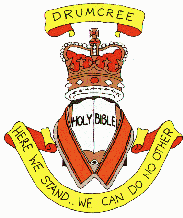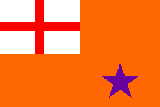|
|
|







The Orange Order, also known as the Loyal Orange Institution, is the
largest Protestant organisation in Northern Ireland, where it has a
membership of 80,000. The membership of the Orange Order is worldwide,
with members belonging to lodges in the Republic of Ireland, United
Kingdom, USA, New Zealand, Australia and West Africa.
The Orange Order was founded in 1795 after a Protestant victory at
Loughgall, County Armagh, in what became known as the Battle of the
Diamond. Orange "lodges" as we know them today did not come into being
until 1795, when a small group of men gathered in the village of
Loughgall and resolved "that at all times they would stand together,
fight for the faith of the Reformed Church, and by all lawful means
support, maintain and defend the Sovereign and Protestant Succession to
the Throne, and to the utmost of their power keep the peace and public
safety".
The Orange Order's name was chosen to commemorate the victory of
Protestant King William of Orange over Catholic King James in the Battle
of the Boyne on July 12, 1690. Portadown was at the forefront in
adopting the new Orange organisation. Influential members in various
lodges in the area felt that the time was right to establish a new
District Lodge. Portadown Orange District LOL No 1 came into existence
on 21 August 1796. The Orange Institution is a Christian organisation.
Orange Order parades are an essential part of Protestant culture and
tradition. The organisation demonstrates their faith through parading -
to give thanks to God for the democratic revolution in Britain in 1690
and the Battle of the Boyne. The Orange Order proclaims "Civil and
religious liberty for all". The routes the parades take were established
long ago, but some of the areas have since been subject to demographic
changes, with Protestants moving out and Catholics moving in. The
processions take place from Easter and throughout the summer. This
period is often called the marching season.
The marches and parades are colourful occasions. Orangemen traditionally
wear bowler hats and orange sashes. They carry banners and are most
often accompanied by musical bands.The flags and banners are full of
religious,cultural, and political symbolism depicting,biblical
scenes,famous people or events in history and in themselves portray the
rich cultural heritage of our people in picture form.Orange Parades are
mostly commemorative. Various events in the history of the Ulster
Protestant people are commemorated by parades that take different
forms.These range from the solemn remembrance of the fallen at the Somme
to the culture extravaganza that is the 12th of July commemorating the
Glorious Revolution secured at the Battle of the Boyne. On July 11, on
the eve of the Twelfth celebrations, bonfires are lit in Protestant
areas throughout Northern Ireland. Lodges traditionally have monthly
meetings, which normally begin with prayers or bible readings and
conclude with the singing of God Save the Queen, the national anthem.
The Orange Order acts as the focal point for many people's social lives
in Northern Ireland. It is through the lodges that meetings, lectures,
band practice and social events like dances are organised. There are
also junior lodges and women's lodges.
The Orange Order has members both male and female, young and old, in
many countries including England, Scotland, Wales, Canada, New Zealand,
Australia, Togo, Ghana and the USA. Traditionally the Orange Order is
seen as a marching organisation. But much work goes on unseen, such as
caring for orphans and supporting widows. The Orange Order has also
supported numerous good causes including hospitals and hospices, as well
as a multitude of charities and missions. That is in addition to
individual contributions by many members. More recently the Orange Order
has embarked on aid to churches in Eastern Europe and support for modern
communication of the gospel overseas. The Orange Order has been
encouraging young people, through bursaries, to develop their own
business, commercial and industrial skills in order to improve the
economy of Northern Ireland

Large bonfires are also lit on the night before the 12th of July to
celebrate victory at The Battle of the Boyne

An Orangeman should have a sincere love and veneration for his Heavenly
Father; a humble and steadfast faith in Jesus Christ, the Saviour of
mankind, believing in Him as the only Mediator between God and man. He
should cultivate truth and justice, brotherly kindness and charity,
devotion and piety, concord and unity and obedience to the laws; his
deportment should be gentle and compassionate, kind and courteous; he
should seek the society of the virtuous and avoid that of the evil.
He should honour and diligently study the Holy Scriptures, and make them
the rule of his faith and practice. He should uphold and defend the
protestant religion and sincerely desire and endeavour to propagate its
doctrines and precepts. He should strenuously oppose the fatal errors
and doctrines of the Church of Rome, and scrupulously avoid
countenancing (by his presence or otherwise) any act or ceremony of
Popish Worship. He should by all lawful means resist the ascendancy of
that Church, its encroachments and the extension of its power, ever
abstaining from all uncharitable words, actions or sentiments towards
Roman Catholics.
He should remember to keep holy the Sabbath day, and attend the public
worship of God, and diligently train up his offspring and all under
under his control, in the fear of God, and in the Protestant faith. He
should never take the name of God in vain, but abstain from all cursing
and profane language, and use every opportunity of discouraging those,
and all other sinful practices in others.
His conduct should be guided by wisdom and prudence, and marked by
honesty, temperance and sobriety. The glory of God and the welfare of
man, the honour of his Sovereign, and the god of his country should be
the motives of his actions.
